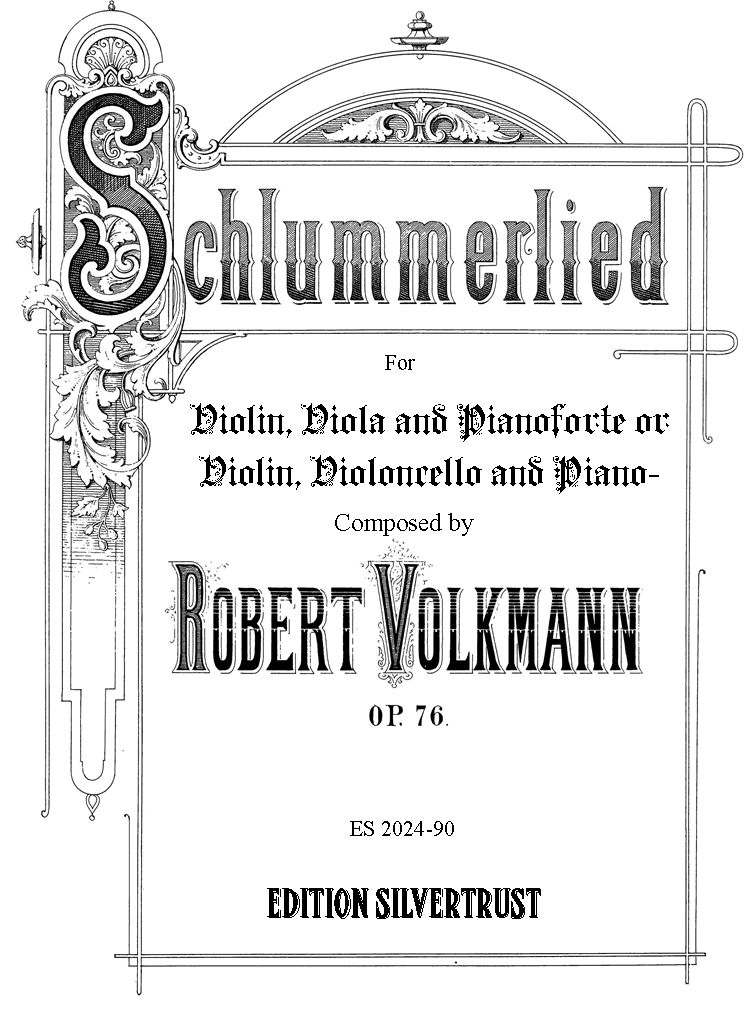Presents
Robert Volkmann
Schlummerlied for Violin or Viola, Cello and Piano, Op.76
 Friedrich
Robert Volkmann (1815-1883) was almost an exact contemporary of Wagner, however,
he certainly did not tread the same path as his fellow countryman. Volkmann
forever kept Beethoven in front of him as his model although he was later to
fall under the sway of Mendelssohn and then Schumann. In his day, Volkmann and
his music were highly regarded. Hans von Bülow, the famous conductor, noted that
when Liszt had a stranger visiting him, for whom he wished to provide a
superlative enjoyment, he played a Volkmann piano trio with Joachim the
famous violinist and the cellist Cossmann. Volkmann's second piano trio was often mentioned in
the same breath as Beethoven’s Op.97, “The Archduke.” High praise indeed
for a composer whose works today are nearly all out of print. During his
lifetime, Volkmann’s music was not only considered the equal of that of Schumann or Mendelssohn but also more advanced. It was commonly
recognized that Volkmann's music was the link between Schumann and Brahms. Ars Longa,
vita brevis as the saying goes, but alas for Volkmann it was not only vita brevis but also fama brevis!
Though born and schooled in Germany, (he studied at Freiburg & Leipzig),
Volkmann, after a brief stint in Prague, got a job in Pest in 1841 and made
friends among the large German community there. Though he went to Vienna in
1854, he missed Pest and moved back in 1858 where he remained for the rest of
his life.
Friedrich
Robert Volkmann (1815-1883) was almost an exact contemporary of Wagner, however,
he certainly did not tread the same path as his fellow countryman. Volkmann
forever kept Beethoven in front of him as his model although he was later to
fall under the sway of Mendelssohn and then Schumann. In his day, Volkmann and
his music were highly regarded. Hans von Bülow, the famous conductor, noted that
when Liszt had a stranger visiting him, for whom he wished to provide a
superlative enjoyment, he played a Volkmann piano trio with Joachim the
famous violinist and the cellist Cossmann. Volkmann's second piano trio was often mentioned in
the same breath as Beethoven’s Op.97, “The Archduke.” High praise indeed
for a composer whose works today are nearly all out of print. During his
lifetime, Volkmann’s music was not only considered the equal of that of Schumann or Mendelssohn but also more advanced. It was commonly
recognized that Volkmann's music was the link between Schumann and Brahms. Ars Longa,
vita brevis as the saying goes, but alas for Volkmann it was not only vita brevis but also fama brevis!
Though born and schooled in Germany, (he studied at Freiburg & Leipzig),
Volkmann, after a brief stint in Prague, got a job in Pest in 1841 and made
friends among the large German community there. Though he went to Vienna in
1854, he missed Pest and moved back in 1858 where he remained for the rest of
his life.
His Schlummerlied (literally Slumber Song, or Lullaby) gives a strong impression of Volkmann’s style. Imbued with the romantic vocabulary of Brahms and his circle, the work is both well crafted and highly attractive. Though based on a long-short-long-short rhythm common to the barcarolle which reflects the gentle rowing of the Venetian gondolier, Volkmann’s melodies betray the unmistakable folk-like character of the Austrian countryside. The music builds in intensity towards its center, giving way to a piano cadenza, then returns to its opening themes, before tapering off to a state of repose.
Originally scored for viola, cello and piano, due to popular demand, we have add a violin part as a replacement for the viola so this beautiful work can also be played as a standard piano trio.